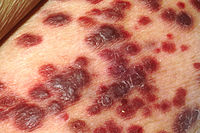
Photo from wikipedia
In HIV infection, increased adverse perinatal outcomes reported among HIV-associated pregnancies are not fully understood. Currently, microbial product translocation (MT) from a permeable mucosa is demonstrated as a driver of… Click to show full abstract
In HIV infection, increased adverse perinatal outcomes reported among HIV-associated pregnancies are not fully understood. Currently, microbial product translocation (MT) from a permeable mucosa is demonstrated as a driver of inflammation, and may contribute to preterm delivery in HIV. Here, our results showed that plasma LPS levels (a representative marker of MT) were increased in HIV-infected women in the first and second trimester. Progesterone levels were significantly decreased in HIV-infected subjects in the first trimester and second trimester. There were significant inverse correlations between plasma LPS and progesterone in the first and second trimester. These results suggested heightened systemic MT and decreased plasma progesterone levels in HIV-infected pregnant women may play a role in increased incidence of preterm delivery.
Journal Title: Journal of reproductive immunology
Year Published: 2018
Link to full text (if available)
Share on Social Media: Sign Up to like & get
recommendations!